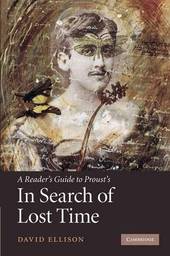
|
A Reader's Guide to Proust's 'In Search of Lost Time'
Paperback / softback
Main Details
| Title |
A Reader's Guide to Proust's 'In Search of Lost Time'
|
| Authors and Contributors |
By (author) David Ellison
|
| Physical Properties |
| Format:Paperback / softback | | Pages:230 | | Dimensions(mm): Height 228,Width 152 |
|
| Category/Genre | Literature - history and criticism
Literary studies - fiction, novelists and prose writers |
|---|
| ISBN/Barcode |
9780521720069
|
| Classifications | Dewey:843.912 |
|---|
| Audience | | Tertiary Education (US: College) | | Professional & Vocational | |
|---|
| Illustrations |
7 Halftones, black and white
|
|
Publishing Details |
| Publisher |
Cambridge University Press
|
| Imprint |
Cambridge University Press
|
| Publication Date |
18 February 2010 |
| Publication Country |
United Kingdom
|
Description
Proust's 'A la recherche du temps perdu' (In Search of Lost Time) is many things at once: a novel of education, a portrait of French society during the Third Republic, a masterful psychological analysis of love, a reflection on homosexuality, an essay in moral and aesthetic theory, and, above all, one of the great literary achievements of the twentieth century. This Reader's Guide analyses each volume of the 'Recherche' in order and in detail. Without jargon or technical language, David Ellison leads the reader through the work, clarifying but not oversimplifying the intricate beauty of Proust's imaginary universe. Focused both on large themes and on narrative and stylistic particularities, Ellison's readings expand our understanding and appreciation of the work and provide tools for the further study of Proust. All French quotations are translated, making this an ideal guide for students of comparative literature as well as of French.
Author Biography
David Ellison is Distinguished Professor in the Humanities at the University of Miami, Florida.
Reviews'This elegant and luminously written Reader's Guide makes an excellent addition to already existing critical introductions ... A must for students of the Recherche, it also offers stimulating new insights even for the well-versed Proustian.' Modern Language Review
|